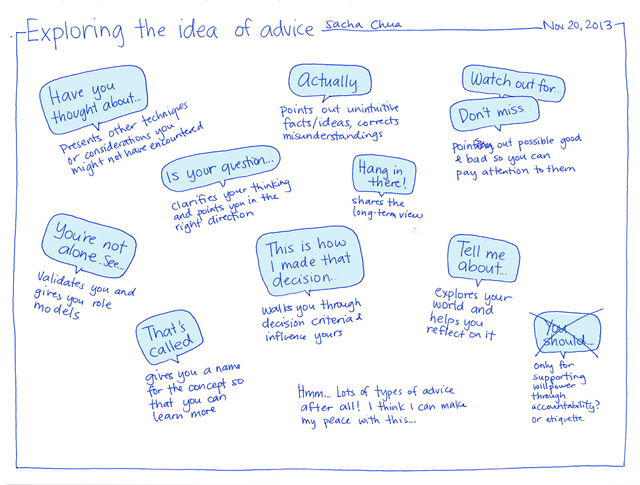 Sometimes I wonder if I should do more of the “Right Things” when it comes to building a blog. You know the drill:
Sometimes I wonder if I should do more of the “Right Things” when it comes to building a blog. You know the drill:
- Focus on one or two topics so that people will subscribe because you’re consistent and reliable.
- Research keywords so that you can optimize for search engine queries and write content that will bring people in.
- Reach out to new audiences with guest posts, working your way up to A-list blogs.
- Send e-mail newsletters so that you can build relationships and sell to people later on.
Why? Because it’s a way to scale up. Maybe I can save more people time. Maybe I can learn from more people. Maybe I can create more value for each hour that I spend.
It’s easy to see what success could look like, down that path. Sometimes I’m envious of blogs with tens of thousands of subscribers and hundreds of comments per post.
But then reading and responding to comments takes time, and other people glaze over when they see pages and pages. It’s okay. I like where we are – maybe half a dozen comments or so on a good post, and I feel good about writing many paragraphs in reply. I’m not entirely sure if I’m just sour-graping, but it makes sense. This is manageable. Slightly more is okay too, but we can grow slowly so that I can learn the skills I need along the way.
Sometimes I wonder if this should be more like other blogs. But then that’s a well-travelled path, with lots of other people exploring it and plenty of people willing to sell you courses along the way. I have this amazing opportunity to try something different. I should.
Actually, I already know what I should do: what works for me, what I should do more. The enduring posts on my blog are tech notes (Emacs, Drupal, etc.) and sketches. People also tell me they find this sort of reflective practice—this learning-out-loud—helpful. I can continue like this, growing slowly through links and search results. Instead of spending hours on blog marketing, I can spend hours on learning and writing.
It’s good to reflect on what works or doesn’t work for you. A clear no saves you time and anxiety. I’ve figured out ways to hack around my introversion, and maybe the same will be true for blogging.
So here, I think, is how I’ll grow this blog compared to the “typical” advice:
- Typical: Focus on one or two topics so that people will subscribe because you’re consistent and reliable. I’ll write about whatever I’m learning about, covering a variety of interests. People who want a focused view can use search results and category links. From time to time, I’ll work on organizing things to make it easier for people to browse around.
- Research keywords so that you can optimize for search engine queries and write content that will bring people in. I’ll look at other people’s questions, and the search queries that are already bringing people to my blog. That will nudge me to write about certain topics if I’m curious about the ideas too. I don’t have to compete when it comes to topics outside my interests or experiences. I can start by making it better for people who care about things I care about.
- Reach out to new audiences with guest posts, working your way up to A-list blogs. I’ll read other blogs and write about what inspires me, linking to those posts. Since many people don’t have their own blogs, I’ll invite people to share their tips and lessons learned on mine.
- Send e-mail newsletters so that you can build relationships and sell to people later on. Since I find it difficult to send e-mail, I’d rather build relationships through comments (and the occasional e-mail for people who want to have slightly more private discussions). Instead of building a list so that I can sell exclusive premium content, I’ll give away as much as I can of what I know under an occasional pay-what-you-want model. There are all sorts of other non-monetary ways to show appreciation, so that’s cool too.
So this blog will grow, slowly, sustainably, in a way that feels comfortable for me.
That said, are there small things I can do to make it easier for you or other people to take advantage of what I know? Is there something I can do to lower the barrier to commenting or help people explore? I’d love to hear from you!


